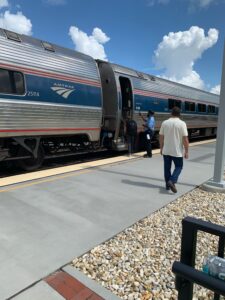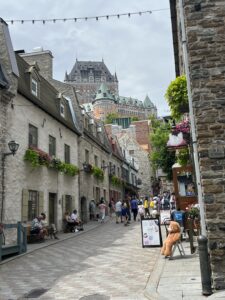Yesterday made exactly a month since I’ve been traveling. In a way, it doesn’t feel like that long because some of the first two weeks were in America, but it was July 4th that I left Mississippi on the Amtrak train with only an overstuffed backpack and a daypack. We think of backpacking as something specific to Europe or Southeast Asia, but I wish we could make popular the idea of backpacking around North America, too. Let me tell you about my love for Amtrak.
When I lived in DC 5 years ago and was feeling particularly averse to flying, I discovered a wonderful fact—the Amtrak Crescent line runs directly from New York City to New Orleans with stops right where I needed them to be—DC and my hometown of Picayune, Mississippi. It felt like a personalized gift just for me. And while most people thought I’d lost my mind, I traveled exclusively by train to and from home that year. It seemed obvious to me that the 24-hour train ride in coach class was far superior to the 2 and ½ hour one-way flight. And I still stand by this. Amtrak is vastly underappreciated, and we should be doing everything we can to give them our business and loyalty. They give you so much space! And time to read/write. You can socialize. There’s a snack car. There are dogs sometimes. There’s even a real restaurant with Christmas decorations in winter! Plus the other people on the train are a self-selecting sort. They must have an interesting story if they have also selected a train for long-distance travel since Amtrak tickets are really not cheaper than flights on this route (except perhaps for this summer when even private yachts might be cheaper than flying). I’ve even made friends on Amtrak journeys that I kept in touch with for years.

And so, when I decided to leave on my travels this summer without yet flying, Amtrak was the obvious travel method. And destinations that would put me in the spirit of European travel but were accessible by train were obvious, too. Montreal and Quebec City.
So I bought a rail pass—the United State’s attempt at something close to a Eurail ticket. It sounds crazy expensive, but it’s quite a good deal. For $499, you can take any ten Amtrak rides within a month. So Picayune to DC, regular price $250, counted as one ride. I figured if I bailed on the flight to Europe, I’d still have enough of my 10 rides left to go somewhere else for a while and/or to get home, and if I didn’t bail on the flight, I’d have spent over $450 on individual one-way tickets to all the cities where I was stopping without the pass anyway. There was a rough plan, but not a set one. I took the train to DC and spent a night. I saw my best friend from college there–the first time we’d seen each other in person in 5 years—and it felt like no years had passed. It also felt like no years had passed since I left DC in some ways. I spent the next night in New York City and ate cookies at a rooftop bar and drank butterbeer for breakfast with Elijah. Then I spent the next night in a hotel in Saratoga Springs which was as far at that Amtrak line could take me. They still haven’t reopened the line all the way to Montreal because of Covid, so I took a bus to Canada the next day and spent 7 days there.

The first time I visited Montreal and Quebec City 5 years ago, I knew to be prepared to hear a lot of French. I did not know to be prepared to hear almost exclusively French, that street signs and train announcements would be in French, that I’d feel guilty for not, in fact, speaking French. A curious thing about telling people elsewhere in the world that you live in New Orleans is that this makes them assume you must know some French. After all, it’s a French city, right? The tour-guide on my free-walking tour in Quebec City did our tour half in French and half in English to accommodate all the visitors, and after a long monologue in French she looked at me and said, “I’m sure you understood some of that, right?” No. In fact, I didn’t. More than any other language I’ve ever attempted to dabble in, French leaves me baffled. The written language is fine—after my current 318-day Duolingo streak, I can point to something on a French restaurant menu and feel reasonably confident that I know what they will bring me. But if someone reads that same menu to me in French, I wouldn’t have the faintest idea what they were saying. Why are there so many vowels? Why don’t they understand about phonics? Do they realize that word appears to have 3 more syllables than they just pronounced? What letter does that word even start with? Am I going deaf? But in Montreal, everyone is bilingual, so you’re easily forgiven. It’s remarkable how effectively we can communicate with each other if we try hard enough.

Montreal is a curious city in that it’s familiar while feeling totally new. There is a component of it that feels European of course, because of the language and the Old Port area and Notre Dame (the most beautiful church in North America, I think), and Quebec City looks like a story-book version of a French village (specifically the Disney variety, but in a way that feels adorable instead of tacky). But at the same time, you’re only a 6-hour drive from NYC. There are toiletries in the grocery stores (a strictly North American phenomenon from what I’ve seen). The stores themselves are the same as the ones you shop in at home. It feels very clean. Like a new and polished place, even though by North American standards, it’s about as old as a city can be. Quebec City is one of the oldest on the continent. Maybe these cities feel new to me because they lack a particular grittiness that cities like New York City have, like they haven’t gotten tired yet. It feels safe. I was on the metro platform waiting for a train in Montreal when an announcement came over the loudspeaker system, first in French then in heavily accented English. The only word I could make out was the word “evacuate.” Half the people on the platform left right away, but slowly and calmly, totally unbothered. I thought about what it would have been like if I’d been on a NYC or Chicago train platform and an announcer had said the word “evacuate.” There would have been a stampede of people fleeing what they believed to be certain death. But there in Montreal, no one was worried, and I wasn’t either. These people don’t have guns, I reasoned. (I found a security guard and asked what was going on, and it was just a pause in service for a medical emergency.)

And there’s the circus. Montreal is the modern circus capital of the world. It’s home to Cirque du Soliel, but also to dozens of other local circus companies that do regular performances throughout town. Completely by chance, I happened to be there during their annual circus festival, which meant there were free, outdoor circus performances throughout the city every night. Unlike in France, the other big circus capital, you can find gyms unpretentious enough to let people like me, or even true beginners, try out classes for fun. It’s hard to differentiate between what might be considered the counter-culture and what’s just the culture. It’s a welcoming city and a welcoming community. The people here seem like they aren’t jaded by over-tourism, and they’re glad to see you.
If you haven’t traveled internationally and would like to visit a place that feels like a new experience but isn’t too far out of your comfort zone, Montreal (for a big international city experience) and Quebec City (for a quaint and smaller feel) have my vote.
I went back to DC the same way I came—back on the bus to Saratoga, then the train to NYC, then the train to DC. I mailed a small box of souvenirs home and washed my clothes and re-packed all my toiletries in a gallon bag for the airport (which Dulles no longer requires—who knew?). And then I left my unused Amtrak pass and did NOT bail on the flight.
